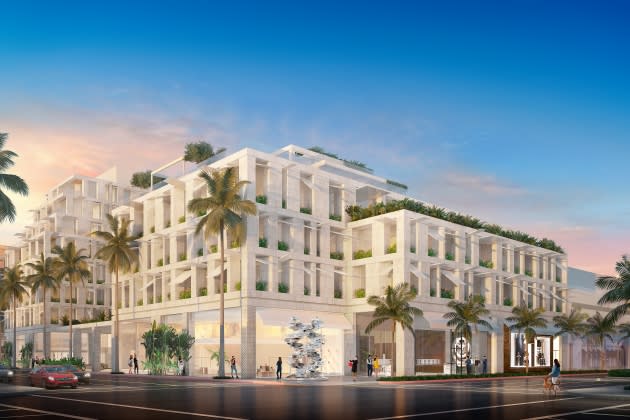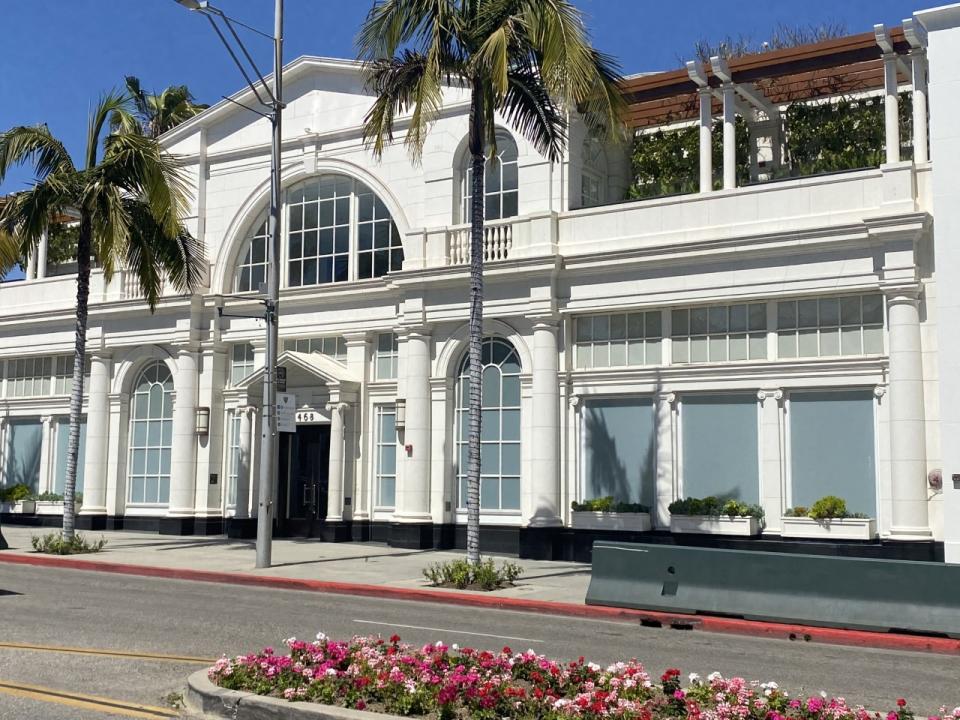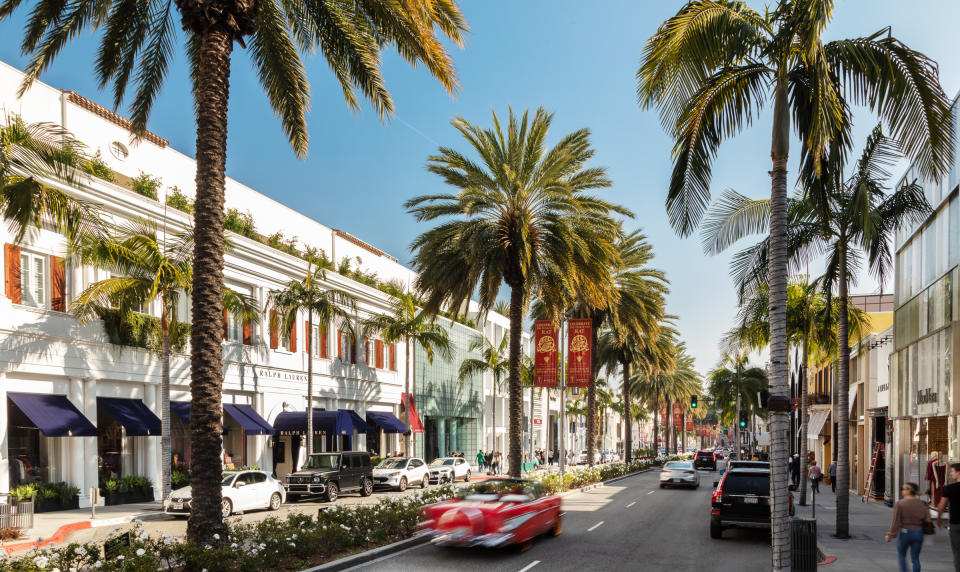LVMH Cheval Blanc Hotel in Beverly Hills Hits a Stumbling Block

LVMH Moët Hennessy Louis Vuitton has spent nearly three years cobbling together architectural plans, studies and analyses to make sure its first Cheval Blanc hotel in the U.S. would be the right fit for Beverly Hills. And it was successful. Late last year, the Beverly Hills City Council voted 4-1 to green-light the project sitting at the north end of the Rodeo Drive shopping area.
But some people were unhappy a 109-room hotel, framed by Rodeo Drive, Little Santa Monica Boulevard and Beverly Drive, would rise nine stories on one side and tower over surrounding retail and commercial spaces sitting at three and four stories high. Four buildings would have to be razed, and the idea of more traffic coming to the area was unsettling.
More from WWD
Early this year, development opponents gathered enough signatures to prompt a May 23 special election for the city’s 22,000 registered voters to decide on two issues that could make or break the project. The signature gathering movement was spearheaded by Unite Here Local 11, a union representing hotel workers and other industry employees, and joined by discontented residents.
Referendum B challenges the zoning change allowing the hotel to be nine stories on the Beverly side while the Rodeo Drive side will be confined to four stories. Referendum C takes issue with the development agreement that doesn’t allow the city to change the development rules once the project is approved. A “no” vote on either referendum would stop the hotel, in its current form, from going forward.
LVMH would have to return to the drawing board and submit a new proposal. Anish Melwani, chairman and chief executive officer of LVMH North America, noted this will not happen. “This will be our one and only attempt to bring Cheval Blanc to Beverly Hills,” he wrote in an email. “If this effort is not successful, the space will probably be used for retail.”

He said LVMH has spent years going through a rigorous review process and environmental study that included public meetings where residents were able to express their thoughts and city officials vetted the project replacing four buildings — two on Rodeo Drive and two on Beverly Drive. One of those buildings, the former Brooks Brothers store at 468 N. Rodeo Drive encompassing 22,250 square feet, was acquired by LVMH in 2018 for $245 million.
The Cheval Blanc hotel, designed by New York architect Peter Marino, will have ground-floor retail on Rodeo Drive, restaurants, meeting rooms, a spa and a private club for 500 members. “Not only will this hotel set a new standard of luxury, but it will also serve as a powerful economic engine that will help keep Beverly Hills an exceptional place to live,” Melwani explained. “It is important to note that Cheval Blanc will be a very modestly sized hotel. It will have just 109 rooms, making it the smallest luxury hotel in the Golden Triangle, with no conferences, events or group business.”
He pointed out that more than one year ago, LVMH acquired the Luxe Hotel on North Rodeo Drive, a decades-old five-story boutique hotel hit hard by the pandemic, forcing the Harkham family to sell it for $200 million. LVMH has closed the hotel and has other plans for the property, although Melwani would not divulge those plans. “The total increase in hotel rooms in the area after Cheval Blanc opens will be very limited — a net increase of just 21 rooms in the city,” he wrote.
Beverly Hills is a world-famous city of 32,000 residents that still maintains a quaint, small town feel despite the luxury stores that populate Rodeo Drive and the multimillion-dollar residential estates that attract tourists to drive up and down the tree-lined streets searching for movie stars’ homes.

The pedestrian-friendly, three-block area starts with Two Rodeo Drive, a faux European-style curved street with several clothing and jewelry boutiques, and then stretches north past luxury brands that are building bigger boutiques, including the new 30,000-square-foot Chanel store, Fendi, Dior, Louis Vuitton, Burberry, Tom Ford, Loewe, Giorgio Armani, Gucci, Loro Piana, Prada, Ralph Lauren, Saint Laurent and Versace. Several of them are owned by LVMH, whose revenues last year totaled $87 billion.
However, Cheval Blanc opponents want to keep that small town vibe. “The area is charming and beautiful right now, and, if and when they are able to put that project out there, it will not be. It is very nice to be around low-rise buildings. You can sit at a sidewalk café in Beverly Hills and look across the street and see the hills. It is a very good feeling,” said Darian Bojeaux, an attorney who has lived in the city for 35 years and signed the petitions launching a special election. “Let them build a code-compliant hotel that is three stories high. Let them build something nice that doesn’t ruin the city.”
John Mirisch, the only city council member voting against the project, agreed. He believes the hotel is too tall on one side and the city should be getting more revenue from the project. “I would like to see a scaled-back project with a fair development agreement. They are projecting that the average room price will be $2,000 a night. The city should be asking an additional 5 percent [bed tax], and we should use those funds to finance affordable housing for our less fortunate.”
Affordable housing is the issue Unite Here Local 11 said it feels was not addressed when the development was approved and why it currently opposes the project. “We watch municipalities change development rules to make it easier to build luxury commercial projects like hotels, but they do not always do this for housing,” said Danielle Wilson, a research analyst with Unite Here Local 11. “We believe the development agreement between the city and the developer for the project is weak and does not provide sufficient community benefits, including by failing to earmark any of the funds for affordable housing.”
Some contend the union is just trying to pressure Cheval Blanc to let its hotel workers unionize. Wilson denied that, and Melwani maintained it is up to the hotel workers to decide to unionize or not. Three of Beverly Hills’ 16 hotels (the Beverly Wilshire Hotel, the Waldorf Astoria Beverly Hills and the Beverly Hilton) are unionized, the city said.
Cheval Blanc proponents believe this hotel is a win/win situation for Beverly Hills. It provides an additional revenue source and a badly needed anchor at the north end of the street.
“This is honestly, truly a no-brainer,” said Kathy Gohari, the boutique director at Audemars Piguet and the president of the Rodeo Drive Committee. “For decades, Rodeo Drive has had an amazing anchor with the Beverly Wilshire Hotel on the south. But one of our most important blocks [on the north] on Rodeo Drive has never flourished. What better partner than Cheval Blanc to do that?”
Merchants believe a new hotel and its tax revenue will help keep the area safe with more funding for the Beverly Hills Police Department, whose average response time to most crimes is only three minutes. During the pandemic and after, there was a rash of jewelry store smash-and-grabs on Rodeo Drive as well as attempted store robberies.
Now there is enhanced security with more street cameras, drones, private security and police patrols. Last December, the police department added a new drone called “Hawkeye,” whose high-resolution camera can read license plates a half-mile away. Rodeo Drive store owners emphasize this all takes money.
Lili Bosse, Beverly Hills’ mayor when the project was approved last November and a current city council member, believes this multimillion-dollar development, whose total cost has not been revealed, is just what Rodeo Drive needs to burnish its image and guarantee future revenue. The hotel should generate some $778 million in unrestricted funding over the next 30 years, $26 million in non-earmarked funds and $2 million to support local art and culture.
Bosse said the city council can use part of that unrestricted funding for affordable housing. “I feel that this project really is going to take our city into the next 100 years,” said the city council member, who has lived in the city for 50 years since she was a child. “I think this project will be world-renowned. I think it is a gift to our community and future generations.”
Many feel honored that Beverly Hills was chosen to be Cheval Blanc’s first U.S. location. LVMH launched its ultra-high-end hotel chain in 2006 when it opened its first resort in the French ski resort of Courchevel. It has other locations in Paris and Saint-Tropez, France; St. Barths in the French West Indies, and Randheli in the Maldives.
This is not the first time that Beverly Hills voters have decided the fate of a luxury hotel. In 2005, many residents opposed the five-star Montage Hotel (now called The Maybourne Beverly Hills) because of its dense size some believed would gridlock traffic and not fit in with the village feel. The 214-room hotel rising eight stories spent years getting its project off the ground. In the end, it won the election. More than 4,000 voters gave a thumbs-up for the hotel while 3,400 residents nixed it.
“We have great confidence that the people of Beverly Hills will show their support for their city’s decision-making process and vote to reaffirm Cheval Blanc,” Melwani wrote in his email. “They will also send a message that Beverly Hills welcomes the kind of investment that will maintain and strengthen its position in the global pantheon of luxury.”
Best of WWD

